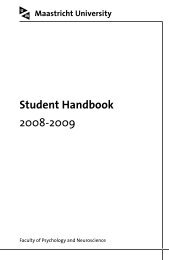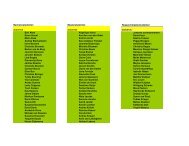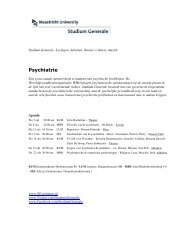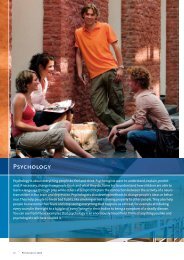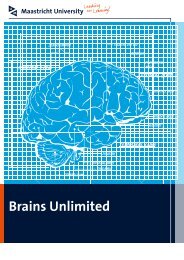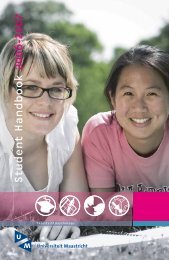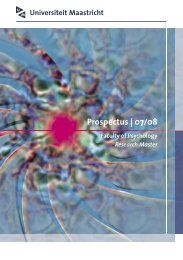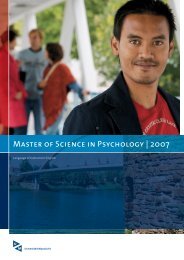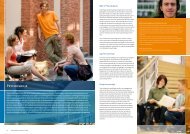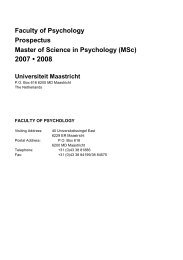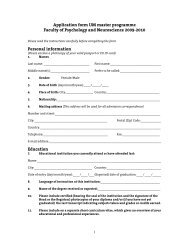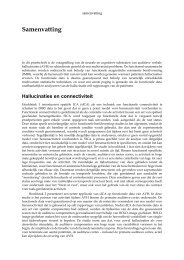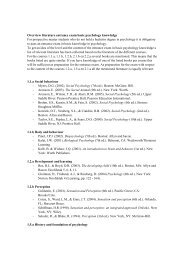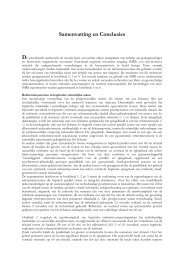Prospectus | 08/09 - Psychology and Neuroscience - Maastricht ...
Prospectus | 08/09 - Psychology and Neuroscience - Maastricht ...
Prospectus | 08/09 - Psychology and Neuroscience - Maastricht ...
Create successful ePaper yourself
Turn your PDF publications into a flip-book with our unique Google optimized e-Paper software.
Chapter 6 - Education <strong>and</strong> Examination Regulations<br />
6.2 Rules <strong>and</strong> Regulations<br />
for the Research Master’s examination of the study programme<br />
Cognitive <strong>Neuroscience</strong>, Fundamental <strong>Neuroscience</strong>,<br />
Neuropsychology, Psychopathology<br />
Article 1<br />
Board of Examiners<br />
The Board of Examiners sees to the execution of the regulation for the Research<br />
Master’s examination <strong>and</strong> its parts, taking into account the law <strong>and</strong> the education <strong>and</strong><br />
examination regulations concerning the organization <strong>and</strong> scope of the examinations of<br />
the Research Master’s study programme of the Faculty of <strong>Psychology</strong> <strong>and</strong> <strong>Neuroscience</strong>.<br />
The Board of Examiners appoints examiners who are competent to assess student<br />
performance in a course. In particular cases the Board of Examiners can annul decisions<br />
taken by the examiners <strong>and</strong> can take its own new decision. This will in particular be the<br />
case if a student has not complied with the admission requirements for a part of the<br />
examination which he/she has completed.<br />
133<br />
Article 2 Composition of the Research Master’s Examination<br />
The Research Master’s examination consists of the following parts:<br />
a. the courses pertaining to the Research Master’s specialization;<br />
b. the other courses, workshops, skills trainings, <strong>and</strong> colloquia;<br />
c. the tutorial group meetings pertaining to the courses as meant under a.;<br />
d. the research internship <strong>and</strong> the Master’s thesis;<br />
e. where applicable, the clinical internship <strong>and</strong> Minor’s thesis.<br />
Article 3 Proof of Having Passed a Course<br />
1. Core Courses<br />
A student can have a course registered as passed if the following requirements have been<br />
met:<br />
• A minimum of 85% attendance at the tutorial group meetings. A student who<br />
arrives more than 10 minutes after the official starting time of the meeting shall be<br />
considered not to have attended. For admission to the course examination, a student<br />
must have attended a minimum of 85% of the tutorial group. If a student has not<br />
complied with the minimum attendance requirement but has not missed more than<br />
one meeting than is allowed, he/she will be admitted provisionally to participate in<br />
the course examination. In this case a student can still comply with the minimum<br />
attendance requirement by applying for a compensatory assignment;<br />
• A satisfactory assessment for the practical training, if applicable;<br />
• At least sufficient marks for the final course assessment.<br />
2. Interdisciplinary Perspectives<br />
A student can have a Interdisciplinary Perspectives course registered as having been<br />
passed if the following requirements have been met:<br />
• Attending a minimum of 85% of the sessions;<br />
• A satisfactory assessment for the course.



